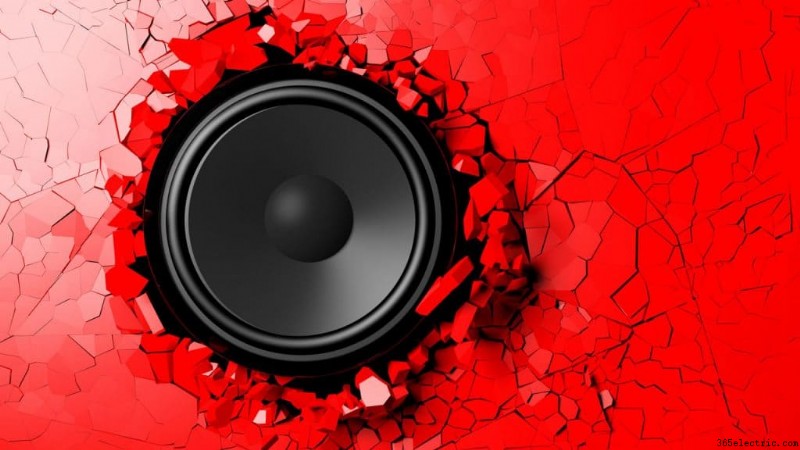スピーカーが大音量でポップする理由
お気に入りのプレイリストを聴きたいときはいつでもあり、スピーカーは大音量でポップします。スピーカーから出ているポップ音は何ですか?
多くの要因がスピーカーの歪みやポッピングを引き起こします。多くの場合、スピーカーを極端に押し込み、主にスピーカーの過小負荷または過負荷によって発生します。
また読む:スピーカーが吹き飛ばされているかどうかを確認する方法

過小負荷または過負荷とは正確には何ですか? また、スピーカーの音が歪むその他の理由として考えられるものは何ですか?最も重要なことは、これが起こらないようにするにはどうすればよいでしょうか?
スピーカーのしくみ
スピーカーは音を作る機械です。スピーカーは、内部のメカニズムを動かして空気を圧縮し、細分化して圧力波と振動を発生させて音を生成することによって音を生成します。
優れたスピーカーは、ソース オーディオから可能な限り正確にすべての音または周波数を再現します。
スピーカーにはそれぞれの魅力があります。たとえば、高音が優れているスピーカーもあれば、低音が優れているスピーカーもあります。全体として、次の要因により、生成されるサウンドが異なる場合があります。
<オール>一部のスピーカーには、音の周波数特性もあります。サブウーファーは最低周波数に特化していますが、ウーファーはサブウーファーよりも少し高い低周波数に特化しています。
ツイーターは最高周波数に特化しています。
ホームシアターにおすすめのスピーカーをチェックしてください。
大音量での歪みやスピーカーのポップ音とは正確には何ですか?
音における歪みとは、入力波形とは対照的に出力波形が変形することを指します。
技術的には、音の歪みは、入力から出力までの波形の違いを指します。
訓練を受けていない耳には、違いがわずかに聞こえるか、ほとんどの場合、気付かないかもしれません。しかし、歪みとポッピングが極端になると、最も訓練されていない有能な耳でも聞こえるようになります。
これは通常、スピーカー ドライバーの非直線的な動きが原因です。
スピーカーが大音量で鳴りますか?その理由
オーディオの歪みやポップ音には多くの原因がありますが、次の 4 つの状況にある可能性があります。
悪いソース オーディオ
どんなに良いスピーカーでも、入力音が悪ければスピーカーから出てくる音も悪くなります。 .mp3 と .flac の標準形式を使用しても、スピーカーからのサウンド出力は、オーディオ ファイル自体と同程度にしかなりません。
ソースオーディオが粗末になる理由はたくさんあります。オーディオを録音するマイクがひどいか、オーディオの制作がひどい可能性があります。
メーカーは、意図的にローファイ (耳が痛くならないようにする) など、意図的にそのようにする場合があります。
また、ソース オーディオが粗末になる別の原因もあり、それは圧縮です。ほとんどの場合、YouTube、Soundcloud、Facebook などのオーディオおよびビデオ共有プラットフォームからの 1 回の圧縮では、ファイルがわずかに圧縮されるだけです。
しかし、ファイルが何度も再アップロードおよび再ダウンロードされると、複数回の圧縮により、あまり良くない聴覚体験が生じる可能性があります.
オーバーロード
状況は次のとおりです。低ワットのスピーカーには少し多すぎるワット数を吐き出すアンプがあります。さらに悪いことに、この状況がクロスオーバー ネットワーク (スピーカーのネットワーク) で発生すると、信号漏れが発生する可能性があります。
上で説明したように、ツイーターは高周波信号を放出しますが、低周波漏れがツイーターにジャンプするとどうなりますか?その結果、スピーカー内の非線形アクション、つまり歪みが生じます。
このように考えてください。ツイーターは、クロスオーバー ネットワーク内で最も甘い高音域を提供するはずです。そして突然、低音のオーディオ信号が発生し、ツイーターを完全に圧倒します。大音量でスピーカーをポップさせることができます。
過負荷のもう 1 つの問題は、過負荷が過剰な電力を適切に処理できない可能性があることです。
消散されない電気エネルギーが熱を発生させ、ボイスコイルが溶けたり燃えたりする可能性があります。
その結果、スピーカーの電気的接続が壊れ、スピーカーが高品質のサウンドを生成できなくなったり、まったくサウンドを生成できなくなったりする可能性があります。
アンダーロード
あなたはそのスピーカーの音を大きくしたい.音量を上げても、アンプから供給できる電力は限られているようです。なんて恥ずべきことでしょう。
スピーカーの過負荷は、音量を上げるたびにスピーカーからパチパチという音やポップ音が出る理由の 1 つです。より大きな音を出すには、より多くの電力が必要です。
アンプがそのような膨大な負荷を供給できない場合、歪みが発生します。
ほとんどの人は、ラウドスピーカーの歪みの原因について誤解しています。多くの人が、過負荷がスピーカーが歪んだ音を出す一般的な理由であるという意見を表明しています。
現実には、まったく逆のことが当てはまります。スピーカーの出力が不足することの方がはるかに一般的です。
多くの人が、最大、最大、最小、最高のスピーカーを購入することを検討します。
それでも、多くの人は後付けとしてアンプを購入します。しかし、彼らは知らないうちに、高ワット スピーカーと低ワット アンプを使用することはあまり良い考えではありません。
スピーカーの音量を上げると、ドライバーはさらに速く伸びる必要があります。 With this, the speaker will need a lot more power to continue creating good sound quality.
Amplifier Clipping
This type of distortion does not occur due to the speaker’s limitations but comes from the amplifier’s limits.
It happens when an audio file amplifies to extreme highs and lows, wherein the sound required is beyond the amplifier’s capabilities. It can create a situation where speakers pop at high volume.
When amplifier clipping happens, the high and low frequencies beyond the amplifier’s capabilities will be clipped, which means these excess frequencies won’t make it to the speakers, even if the speakers can produce such high and lows.
Physical Damage
Underloading and overloading. When these situations happen too often at your speakers, they may cause permanent physical damage. And with this, your speakers may permanently produce distorted sound.
Physical damage is usually caused by heat (most associated with overloading).
When the speaker gets too hot, wires may melt, and adhesives used within the interiors of your speaker may not work. It can result in distorted sound or no sound at all.
How Do I Prevent Popping, Distortion, And Physical Damage To My Speakers?
Tone it down. Those are the three words that can solve most of your speaker-related problems. Tone it down.
Many may take this advice for granted but toning down your speakers enable your speakers not to require as much electricity as needed, thus reducing the risk of underloading.
Also, since speakers need to create vibrations to produce sound, toning down your speakers may also help reduce the amount of movement the speaker’s internals may suffer.
It will also help with internal component fatigue as less electricity means less heat produced around the system.
Storing your speakers in a cool, dry, and safe place is also crucial for speaker longevity and preventing any possible popping and distortion. Heat is usually the main reason speakers break all the time—also, water damage.
Also, buying quality material is vital when purchasing sound components. Not only can this ensure that your product will last longer, but this can also ensure better sound quality.
“Quality material” does not only refer to speakers, necessarily. In fact, buying the appropriate amplifier is also very crucial to prevent underloading and overloading. It brings me to my next point.
Buy power-matched equipment. Buying power-matched equipment not only helps with sound quality but also helps with the durability of your speakers.
It is because buying power-matched equipment (meaning buying the appropriate power of amplifier concerning the amount of energy your crossover network needs) is essential to prevent any complications within your speaker system.
Reasonably Sound Frequently Asked Questions About Speakers, and Distortion
Do I need to buy a whole set of speakers?
Honestly, no, but it depends on what demographic you reside. For example, suppose you want the best possible listening experience. In that case, you can buy a whole crossover network’s worth of speakers, but most often, you don’t need to.
If you want to have a high-quality listening experience without breaking the bank, a good speaker will do. A pair of budget earbuds or earphones will probably sound better than budget speakers, though.
If I have the best quality speakers, does this mean that I will have the best quality sound?
No. To have the best listening experience, you will need to have an acoustically tuned room, which means that any room with rigid walls and floors is a HARD no-no.
To acoustically tune your room, you may need to go with the basics and start applying sound-absorbing materials, as these disable unnecessary echoes. Also, a constant reminder, buying the appropriate amplifier is a must.
I have my speakers at a relatively low volume. So why is there still that horrible popping sound and distortion?
There are many reasons for that; most commonly, you may either have very damaged speakers or just a low-quality setup.
